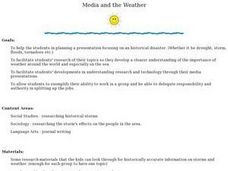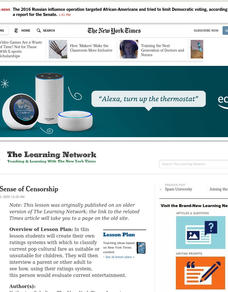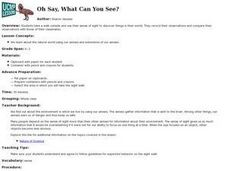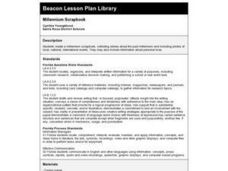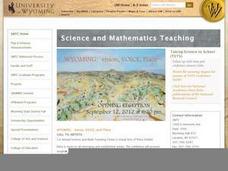Curated OER
Observation
Learners practice observation skills by discussing physical attributes of family artifacts. They determine what characteristics of an object are considered important details.
Curated OER
Endangered Species and Extinction
Fourth graders explore endangered species and extinction. They discuss and write three reasons why it is important to save animals from becoming endangered or extinct. They discuss The Great Kapok Tree and write a letter discussing...
Curated OER
Media and the Weather
Students research an historical weather disaster and create a group media presentation emphasizing the importance of weather around the world and on the sea. Presentation is in the format of a T.V. news story, a radio news story, or a...
Curated OER
Publishing Pupils
Second graders are guided through the writing process and then given time to use the skills they have acquired by writing a story and publishing it using a computer.
Curated OER
Making Sense of Censorship
Students create their own ratings systems with which to classify current pop cultural fare as suitable or unsuitable for Students.
Curated OER
Oh Say, What Can You See?
Students take a walk outside and use their sense of sight to discover things in their world. They record their observations and compare their observations with those of their classmates.
Curated OER
Who's on First?
Fourth graders experience playing different positions in the outfield and learn the position numbers. After viewing Abbott and Costello's, "Who's On First," students go outside and play the game, "Move Up."
Curated OER
Millennium Scrapbook
Third graders create a millennium scrapbook, collecting stories about the past millennium and including photos of local, national and international events.
Curated OER
Testing the Hypothesis
Students create and conduct various experiments to determine the origin of a family artifact, and then determine whether their results were successful. Students summarize their results and evaluate whether their hypotheses were correct.
Curated OER
Seltzer Breath
Students investigate "indicator" (Bromothymol Blue or BTB) to test for the presence of certain chemicals in liquids and gases. They compare distilled water and seltzer water for presence of carbon dioxide.
Curated OER
Geography: Analyzing the Local Environment
Students, in groups, explore the school grounds and organize their findings according to the five themes of geography. They take notes and sketch the grounds. Students divide the school and grounds into regions based on use.
Curated OER
Maintaining Employment
Students discuss the importance of asking for help during work situations and role play in small groups. They complete clarification worksheets then role play different situations and practice new vocabulary.
Curated OER
ESOL Transportation and Travel
Students identify safe driving practices and discuss new vocabulary to go along with it. They compare and contrast safe driving practices in the U.S. and the students' native countries.
Curated OER
Rice Plantation
Eighth graders study the importance of rice as a cash crop and the crop's dependency on slave labor during the settlement of coastal South Carolina. They explain the importance of the rice plantations to South Carolina's colonial economy.
Curated OER
The Skinny on Sororities
Students explore the boundary between membership exclusivity and illegal discrimination in private organizations by examining a recent case of alleged discrimination in a college.
Curated OER
Biome Exchange: Send the Stuff Not The Kids
Learners exchange information with students from various geographic biomes. They explore the unique ecologically significant features of the biomes and share with other learners.
Curated OER
Probability Plus
Students participate in a variety of activities to understand statistics. They collect and interpret data. Also students distinguish the difference between a population and a sample. They make inferences and create arguments using data.
Curated OER
Sing Hot And Cold
Students sing the English songs that are mentioned on the board. The closer the 'seeker' gets to the hidden object, the louder the class will sing; the farther, the quieter. From these clues the pupil should be able to find the hidden...
Curated OER
Izzie's Igloo
Students must be phonemically aware to both read and write. This means that the student must understand phonemes and the relationship between letters and sounds. In this lesson, students work on the phoneme i=/i/. Since vowels are the...
Curated OER
Search and Seizure in Utah
Students identify legal requirements of searches conducted with and without a warrant. They identify the legal standard for conducting searches in public schools. Students discuss the permit of search and seizure and have a search...
Curated OER
Take Me Out of the Ballgame
Students examine their own views on cheating. They explore the history of cheating in baseball by reading and discussing the article "Cheating Matters (Sometimes)." They create proposals for an exhibit that documents and explains the...
Curated OER
Fractions and Measuring in Cooking
Sixth graders explore cooking by creating food in class. In this ingredient measurement lesson, 6th graders discuss some of their favorite foods and review the proper recipes to cook them. Students utilize fractions to create a new...




